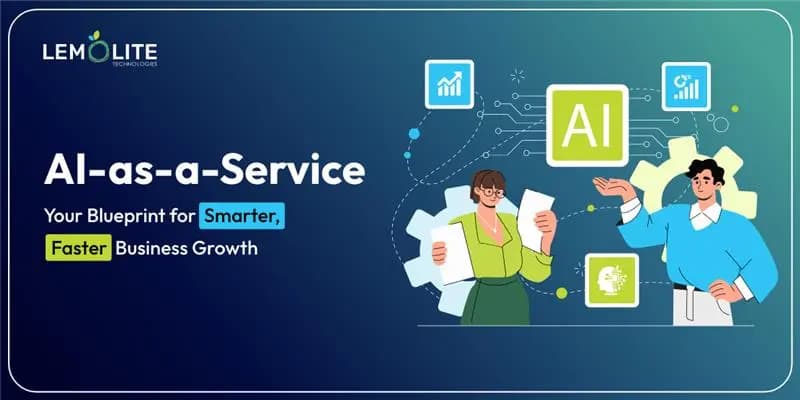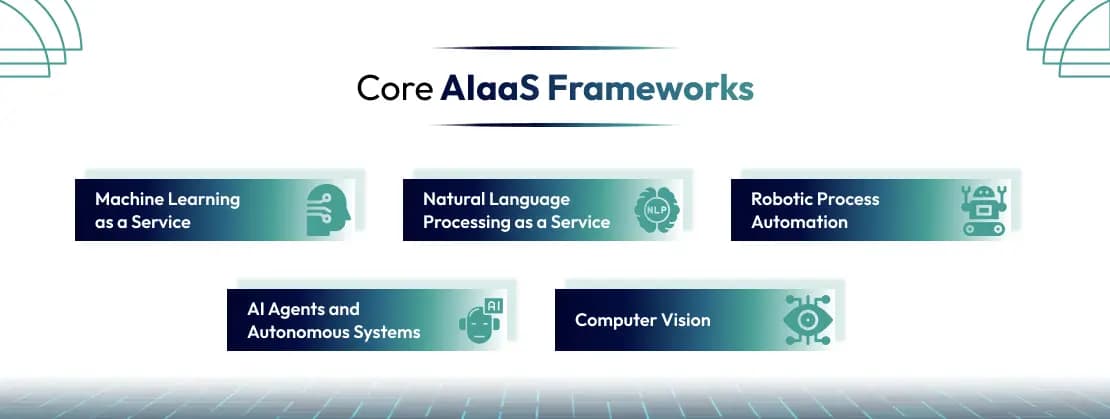
AI-as-a-Service Your Blueprint for Smarter, Faster Business Growth
Hey there! Let’s start with a simple question: have you ever wished your business could think faster, predict better, and automate tasks without hiring a full team of AI experts? Well, that’s exactly what AI-as-a-Service (AIaaS) is here to do.
Whether you’re running a lean startup, a growing SME, or a large enterprise, AIaaS lets you tap into the power of artificial intelligence without the heavy lift of building infrastructure or hiring specialized talent. Imagine having access to advanced AI tools like predictive analytics, computer vision, and NLP right at your fingertips, all through the cloud, and paying only for what you use. Sounds good, right?
In this guide, we’ll walk you through everything you need to know about AIaaS: what it is, how it works, why businesses are adopting it, and how Lemolite, as a leading AI/ML development service provider, can help you make AI work for you.
By the end, you’ll see why AI is no longer a “future thing” but a tool that can streamline operations, improve customer engagement, and help you make smarter business decisions today.
What Exactly is AI-as-a-Service?
Think of AIaaS like renting a car instead of buying one. You get all the benefits without owning or maintaining it yourself. AIaaS allows businesses to access AI tools directly from cloud platforms, without worrying about infrastructure, hardware, or hiring data scientists.
With AIaaS, you get ready-to-use AI models for:
- •Natural Language Processing (NLP) : chatbots, translation, sentiment analysis
- •Predictive Analytics : sales forecasts, demand planning
- •Computer Vision : defect detection, inventory monitoring
- •Speech Processing : voice recognition, virtual assistants
The best part? You only pay for what you use. This pay-as-you-go model makes AI affordable and accessible for startups, SMEs, and even large enterprises.
AIaaS is more than just a cost-saving solution. It’s a way to accelerate innovation. A startup can launch a product faster, an SME can optimize workflows, and an enterprise can unify data across departments, all without a massive upfront investment.
Why AIaaS is Different from Traditional AI
Traditional AI means building everything in-house: servers, models, algorithms, and teams. It’s expensive, time-consuming, and risky.
| Feature | Traditional AI | AIaaS |
|---|---|---|
Infrastructure | On-premise servers | Cloud-based |
Talent | AI experts required | Pre-built tools, optional experts |
Cost | High upfront investment | Pay-as-you-go |
Time to Deploy | Months or years | Days or weeks |
Scalability | Difficult | Seamless through cloud AI platforms |
The takeaway? AIaaS removes barriers, making advanced AI accessible and practical for all types of businesses.
Your Shortcut to Smarter Automation and Faster Results
Who Can Use AIaaS?
The short answer: everyone.
AIaaS is flexible and scalable, which means it fits startups, SMEs, and enterprises. But the way it’s used varies depending on business size, resources, and goals.
Startups: Innovate Fast Without Breaking the Bank
Startups have big ideas but usually small budgets. Every decision counts, and time is limited. AIaaS is like a secret weapon, letting startups innovate, automate, and scale without the heavy costs of traditional AI.
| Problem | AIaaS Solution |
|---|---|
Limited Resources & Strategic Planning | NLP and Deep Learning analyze market trends, competitors, and customer feedback to deliver cost-effective strategic insights. |
Unreliable Forecasting | Predictive analytics offer accurate sales, demand, and cash flow forecasting for better planning. |
Inventory Management | Computer Vision and AI monitoring optimize stock levels, demand prediction, and replenishment cycles. |
Slow Prototyping | Cloud AI platforms accelerate MVP development using AI features like AR try-ons, recommendation engines, and automated testing. |
Why Startups Should Adopt AIaaS:
For startups, partnering with an AI/ML development company like Lemolite can be the difference between a good idea and a market-winning product.
SMEs: Streamline Operations and Boost Efficiency
Small and medium-sized businesses are often caught between growth and operational constraints. Tight budgets, clunky workflows, and rising competition make it challenging to scale efficiently. That’s where AIaaS shines.
| Challenge | AIaaS Solution |
|---|---|
Overburdened Customer Support | AI-powered automation using NLP chatbots improves response times by 45% and reduces support costs by 35%. |
Inefficient Inventory | AI and Computer Vision monitor stock in real time, cutting inventory waste by up to 25%. |
Slow Strategic Insights | Predictive analytics uncover trends and opportunities rapidly—without hiring a full analytics team. |
Poor Employee Experience | AI tools personalize workflows, optimize task allocation, and enhance overall productivity. |
Innovation Stagnation | AIaaS accelerates R&D and prototyping using predictive analytics and deep learning. |
Customer Engagement | Generative AI, NLP, and predictive analytics deliver multilingual, personalized customer journeys. |
Why SMEs Should Adopt AIaaS:
Enterprises: Scale AI Across Complex Ecosystems
Large enterprises deal with multiple teams, fragmented operations, and huge data volumes. AIaaS allows for modular, incremental adoption, letting enterprises start small and scale AI gradually.
| Challenge | AIaaS Solution |
|---|---|
Fragmented Operations | Integrate AI across teams and processes for smoother workflows |
High Costs | Pay-as-you-go models and hiring AI developers reduce heavy upfront investment |
Slow Scaling | Begin with a single use case, validate ROI, and scale seamlessly without disruption |
Data Silos | Predictive analytics and NLP unify disconnected data to deliver actionable insights |
Our AI/ML development service ensures:
Popular AIaaS Models and Their Benefits

AIaaS comes in several models, each addressing different business needs. Let’s explore the most common ones.
Machine Learning as a Service (MLaaS)
MLaaS provides businesses with pre-built machine learning tools, automated pipelines, and scalable cloud infrastructure—allowing them to build, train, and deploy AI models faster without deep technical expertise.
Key Features:
- ◆Pre-built models
- ◆Automated data processing
- ◆Scalable computing
- ◆User-friendly interfaces
Benefits:
- ◆Faster deployment
- ◆Reduced costs
- ◆Rapid prototyping
Industries:
Healthcare, Retail, Manufacturing, Finance
Natural Language Processing as a Service (NLPaaS)
NLPaaS enables businesses to understand, process, and interact with humans using natural language. It powers chatbots, sentiment analysis, language translation, automated document processing, and more.
Benefits:
- ◆Real-time multilingual communication
- ◆Improved customer engagement
- ◆Reduced workload with automated support
Industries:
- ◆Oil & Gas
- ◆Logistics
- ◆Automotive
Robotic Process Automation (RPA)
RPA automates repetitive, rule-based tasks such as data entry, invoicing, and form processing. When combined with AI, RPA can handle complex workflows, increasing efficiency, accuracy, and operational speed.
Benefits:
- ◆Higher productivity
- ◆Faster task completion
- ◆Reduced human errors
- ◆24/7 operations
Industries:
- ◆Banking
- ◆Healthcare
- ◆Finance
AI Agents and Autonomous Systems
AI agents act independently to coordinate multiple tasks. Autonomous systems power self-driving cars, drones, and automated warehouses. Delivered through AI cloud platforms, they eliminate the need to build AI capabilities from scratch.
Technologies Behind AI Agents:
- ◆Machine Learning & Deep Learning
- ◆NLP
- ◆Planning Algorithms
- ◆Reinforcement Learning
- ◆Computer Vision
Industries:
- ◆Oil & Gas
- ◆Logistics
- ◆Healthcare
Computer Vision
Computer vision transforms images and video into actionable insights. Applications include quality control, inventory monitoring, and autonomous navigation.
Benefits:
- ◆Real-time decision-making
- ◆Enhanced operational visibility
- ◆Improved accuracy and safety
- ◆Cost-efficient quality control
Industries:
- ◆Healthcare
- ◆Manufacturing
- ◆Retail
How to Choose the Right AIaaS Platform
- 1. ROI and Business ImpactBefore anything else, consider how this platform will affect your bottom line. AI implementation is not just about using the latest tech—it’s about solving real business problems.
- Will it save time in operations or customer service?
- Can it reduce costs in areas like inventory management, finance, or HR?
- Will it increase revenue through better customer experiences or smarter decision-making?
- 2. Ease of IntegrationThink about how easily the AI platform integrates into your existing systems. A tool may be powerful, but if it requires a complete overhaul of your current workflows, it may cause delays and additional costs.
- Does it support API integration with your existing CRM, ERP, or analytics systems?
- Can it sync with your cloud storage or databases without complex migrations?
- Will your team need extensive training, or is it user-friendly and intuitive?
- 3. ScalabilityAI isn’t a one-size-fits-all solution. Your business may grow, and your AI platform must grow with it without a redesign.
- Can the platform handle increasing data volumes as your business expands?
- Does it allow adding new AI modules or tools easily?
- Is the cloud infrastructure flexible for scaling up or down?
- 4. Industry FitDifferent industries have unique requirements. Choosing a platform with pre-built industry tools improves efficiency.
- Does it offer industry-specific models or starter kits?
- Are there pre-trained AI solutions for fraud detection, predictive maintenance, or personalized recommendations?
- Does it comply with your industry regulations and standards?
- 5. Support and ExpertiseEven the best AI platform is only as good as the support behind it. Smooth implementation requires strong technical guidance.
- Dedicated technical support for setup, integration, and troubleshooting
- AI consultants or developers for strategy and customization
- Training resources to upskill your team
Emerging AIaaS Trends in 2025
- 1. Advanced Language Models: Smarter Reasoning for Complex TasksAdvanced language models, such as OpenAI’s newest releases, are redefining how AI understands and processes human language. These models go beyond translation or basic queries — they can reason, summarize, analyze context, and deliver deeper insights for complex tasks.
- 2. Generative AI: Immersive Content CreationGenerative AI is revolutionizing creativity by producing images, videos, music, marketing copy, product designs, and more using simple prompts. For businesses, this means faster content production, better personalization, and scalable creative output.
- 3. AI Agents: No-Code Automation for Business ProcessesAI agents are autonomous systems capable of executing complex business operations with minimal human supervision. The latest shift is toward no-code AI agents, enabling non-technical teams to build, deploy, and manage intelligent workflows without writing code.
- 4. AI in Scientific Discovery: Accelerating ResearchAIaaS is expanding far beyond business applications — it is accelerating breakthroughs in scientific research, drug discovery, and materials science. AI models can analyze vast datasets, detect patterns, and simulate experiments significantly faster than traditional research methods.
- 5. Enhanced Chatbots: Conversational AI at ScaleModern AI-powered chatbots now offer context-aware, emotionally intelligent, and natural-sounding conversations. They understand sentiment, intent, and nuance, resulting in more human-like interactions and improved user experiences.
- 6. AI for National Security and CybersecurityAIaaS is increasingly used in national security, surveillance, and cybersecurity. AI systems can detect anomalies, predict emerging threats, and respond faster than human teams, strengthening protection across digital and physical environments.
Implementation Steps for AIaaS

- 1. Discovery : Identify key challenges and areas where AI can add value.
- 2. Prioritize ROI : Focus on solutions that deliver the highest impact first.
- 3. Choose Scalable Tech : Ensure the AI platform can grow with your business.
- 4. Select the Right Model : Align AI capabilities with your unique business objectives.
- 5. Engage Experts : Partner with an AI/ML development company like Lemolite to achieve optimal results.
How Lemolite Can Help
Lemolite offers a full suite of AI solutions aligned with the AIaaS model. From AI-powered automation to cloud AI platforms , we deliver machine learning services, NLP, RPA, and autonomous AI systems designed to accelerate business transformation.
Our AI/ML development service ensures:
With Lemolite, businesses of all sizes can unlock AI’s full potential without the cost or complexity of traditional AI.
Conclusion
AI-as-a-Service has truly changed the game for businesses. Startups, SMEs, and enterprises alike can now leverage AI-powered automation, cloud AI platforms, and AI/ML development services without heavy investments.
The future of AIaaS is booming, and possibilities are limitless. A mix-and-match approach combining machine learning, NLP, RPA, AI agents, and computer vision allows businesses to find what works best for them.
With expert guidance from Lemolite, you can accelerate AI adoption, optimize operations, and scale smarter, positioning your business for long-term success in an AI-driven world.